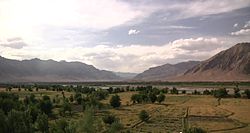Gizab District
|
Gizab گیزاب |
|
|---|---|
| District | |

A pleasant view of a valley in the Gizab District
|
|
| Location within Afghanistan | |
| Coordinates: 33°24′00″N 66°16′12″E / 33.40000°N 66.27000°E | |
| Country |
|
| Province | Uruzgan Province |
Gizab, sometimes spelled as Gezab, is a district in the Uruzgan province of Afghanistan. It has a population of about 75,503 and includes Pashtun, Hazara and Tajik ethnic groups. The district lies along the inexact line dividing Afghanistan's Pashtun tribes in the south from the Hazaras in the country's center—Gizab has a mix of Pashtun and Hazara villages. Gizab was transferred in 2004 from Oruzgan province to Daykundi Province, and then re-annexed to Oruzgan in 2006. The main town Gizab is at 1364 m altitude along the Helmand River.
Prior to the revolt, there had been sporadic reports of violence in the area. On 24 November 2009 it was reported that 6 Taliban fighters, including Mullah Khairullah, the Taliban District chief were killed when going from Gezab District to Charchino area.
The Taliban had maintained a presence in the Gizab area since late 2007 as it is a strategic crossroads for insurgents coming from Pakistan and traveling to the contested provinces of Kandahar and Helmand. Initially, they were welcomed by the residents and many young men from the town were eager to join their ranks as soldiers-for-hire. However, according to Lalay, a local shop-keeper and chief, the Taliban had become increasingly oppressive and desperate for money. "They would frequently stop trucks on the road, either to steal cargo or to levy taxes." These actions began to spread discontent and anger amongst the local residents which came to a head when the local Taliban commander demanded Lalay hand over $24,000 that had been given the town by the Afghan government as compensation for family members killed by Taliban violence. Lalay refused and later told the press, "We had enough of their oppression, so we decided to fight back." The citizens decided to side with the American forces in the area who had been funding local development projects and providing much-needed employment.
During a 2007 press conference, Mohammed Hashim Watanwal, a Wolesi Jirga representative, asserted that anti-government elements controlled all of Gizab district.
...
Wikipedia

